|
|
|
Sort Order |
|
|
|
Items / Page
|
|
|
|
|
|
|
| Srl | Item |
| 1 |
ID:
123582
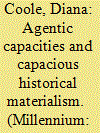

|
|
|
|
|
| Publication |
2013.
|
| Summary/Abstract |
In this article, I note that the idea of a new materialist turn has recently been gathering steam. The first part considers some of the signature elements of the new materialisms. The most distinctive aspect identified here is the invocation of a generative or vital ontology of immanence. Following discussion of some of its principal claims, the article draws out its implications for reconceptualising agency, in particular regarding the way agentic capacities are recognised to be distributed across animate, and perhaps also inanimate, entities. The significance of this development for the political sciences is then explored. In a second part, I suggest that the new materialism entails a normative project. Here, ethical overtures towards a new sensitivity predicated on vital materialist insights are contrasted with a renewed critical theory. The latter is commended as a material reckoning of the 21st century: a project provisionally labelled a capacious historical materialism.
|
|
|
|
|
|
|
|
|
|
|
|
|
|
|
|
| 2 |
ID:
123588
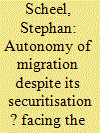

|
|
|
|
|
| Publication |
2013.
|
| Summary/Abstract |
This article reconsiders the concept of autonomy of migration in the context of technologically ever-more sophisticated border regimes by focusing on the case of biometric rebordering. As its name suggests, the concept of autonomy of migration's core thesis proposes that migratory movements yield moments of autonomy in regards to any attempt to control and regulate them. Yet, the concept of autonomy of migration has been repeatedly accused of being based on and contributing to a romanticisation of migration. After outlining two advantages the concept of autonomy of migration offers for the analysis of biometric border regimes, I demonstrate that processes of biometric rebordering increase the warranty of the two allegations, which feed this major critique. Drawing on examples relating to the Visa Information System, I show that processes of biometric rebordering alter the practical terms and material conditions for moments of autonomy of migration to such an extent that it becomes necessary to rethink not only some of the concept of autonomy of migration's central features, but the notion of autonomy itself. In the final section, I therefore point out some directions to develop the concept of autonomy of migration as an approach, which is better equipped to investigate today's struggles of migration without being prone to the critique of implicating a romanticisation of migration.
|
|
|
|
|
|
|
|
|
|
|
|
|
|
|
|
| 3 |
ID:
123590
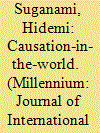

|
|
|
|
|
| Publication |
2013.
|
| Summary/Abstract |
This article examines critical realists' key contention that 'causing', or the operation of causal powers, is real or mind-independent. Against their opponents (causal idealists), they point out the (seeming) empirical obviousness of the mind-independence of causal powers, causal idealism's lack of 'ontological grounding', its 'epistemic fallacy' and so on. The validity or force of such arguments is ultimately dubious, however. Still, the understanding that causal powers are real is a necessary presupposition of scientific knowledge production and application and of our everyday thinking and practice; realists and idealists can converge on this point. Moreover, there is nothing in causal idealism as such that is incompatible with critical realists' key insight that causal laws should be understood as stating the ways things work, producing observable regularities only in closed systems and that regularities are not an intrinsic feature of causal relations. I conclude by exploring the implications of this line of thinking for the study of world politics, endorsing a move from a search for parsimonious theories that explain regular patterns observable in the international system towards a historical study of global social relations, which pays attention to causal complexes, diversity of historical contexts and the contested nature of causal interpretations.
|
|
|
|
|
|
|
|
|
|
|
|
|
|
|
|
| 4 |
ID:
123589
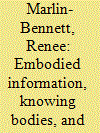

|
|
|
|
|
| Publication |
2013.
|
| Summary/Abstract |
The turn to materialism emerging in world politics scholarship promises fruitful ways of understanding power and political life by focusing on agency in the physical world. Yet immaterial information and 'the virtual' seem to dominate our lives. How can we understand the relationship between the material and the informational? Does this understanding promise any further insight into agency, power, and world politics? The focus in this paper is on the materiality (corporeality) and information of the human body as a special case. Embodied information is the information contained in the body that can potentially be accessed by others through an act of power. The way in which embodied knowledge is implicated in practices of world politics is exemplified by surveillance, DNA databases, and organ trade. Bodies are also the means by which information becomes sensible: we understand information from various sources and with various kinds of content through our bodies' ability to sense. This knowing body is also implicated in power, as exemplified by the use of sound and the augmentation of the senses through technology. Drawing on the interpretation of embodied information and knowing bodies, this article provides a pragmatic model of world politics in which to control how information flows, how it is extracted from the body, how it is inserted or received, how quickly, and to what end, is to have power or to be powerful.
|
|
|
|
|
|
|
|
|
|
|
|
|
|
|
|
| 5 |
ID:
123587
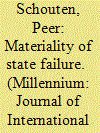

|
|
|
|
|
| Publication |
2013.
|
| Summary/Abstract |
Congo's state failure is usually analysed in terms of a 'broken social contract', reflecting the degree to which mainstream understandings of state failure are conditioned by classical social contract theory. This article takes a different route to understanding Congo's predicament by building on insights from actor-network theory (ANT). ANT's insistence on society as a socio-material entanglement, it shows, translates into increasing attention to the role of material infrastructures in constituting governmental power. Conversely, this approach also allows the highlighting of the importance of the absence of the material underpinnings of rule in drawing up more nuanced accounts of state failure.
|
|
|
|
|
|
|
|
|
|
|
|
|
|
|
|
| 6 |
ID:
123579
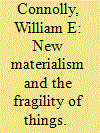

|
|
|
|
|
| Publication |
2013.
|
| Summary/Abstract |
The 'new materialism' is the most common name given to a series of movements in several fields that criticise anthropocentrism, rethink subjectivity by playing up the role of inhuman forces within the human, emphasize the self-organizing powers of several nonhuman processes, explore dissonant relations between those processes and cultural practice, rethink the sources of ethics, and commend the need to fold a planetary dimension more actively and regularly into studies of global, interstate and state politics. After reviewing several key tenets of this diverse movement in philosophy, biology and the human sciences, we focus on how it casts light on the dissonant relations between the drives of neoliberal capitalism and boomerang effects from nonhuman forces. Exploration of such relations both dramatises the fragility of things today and helps to explain why many constituencies refuse to acknowledge and address it. After presenting a few capital-force-field conjunctions that illustrate the fragility of things, this article briefly explores some intercoded counter-strategies to address the contemporary predicament.
|
|
|
|
|
|
|
|
|
|
|
|
|
|
|
|
| 7 |
ID:
123581


|
|
|
|
|
| Publication |
2013.
|
| Summary/Abstract |
While some theorists in International Relations have engaged with thinking about complexity, we would argue that few have thought it through to its logical conclusion - the interconnectedness of systems, and the implications for agency and structure. This article examines the structure-agency question using the framework of 'posthuman international relations', which draws on recent thinking in complexity and argues for an approach to the study of global politics that is post-Newtonian and non-anthropocentric. Key elements of a complexity-based approach are examined, and it is argued that these provide a novel way of considering issues of agency and structure. They also raise issues for the analysis of agency and the link between actions and outcomes. Complex systems can present problems of analysis related to unpredictability, causality and non-linearity. Having laid out a framework for thinking about action and context in international politics, the article turns to questions of agency and practice within complex systems. Perhaps the most significant claim here is that it is possible to conceive of agency beyond the human. Drawing upon Margaret Archer's discussions of primary and corporate agency, a threefold approach to thinking about structure and agency is developed, which allows us to think about agency beyond the human. Finally, an explanation is given as to why a complex approach to thinking about international relations ultimately implies a posthuman perspective.
|
|
|
|
|
|
|
|
|
|
|
|
|
|
|
|
| 8 |
ID:
123584


|
|
|
|
|
| Publication |
2013.
|
| Summary/Abstract |
This article employs the neo-Ricardian concept of quasi-rents - temporary above-market returns - to vindicate the structuralist claim that patterns of international order are shaped by global inequality and the transnational division of labour. Developing a framework linking the distribution of quasi-rents within the global economy to the process of class formation, the article examines the implications for the influential 'social market democracy' explanation of the democratic peace. It argues that the democratic peace is in part predicated on the quasi-rents enjoyed by substantial sections of the workforces of the 'core' advanced industrial states. Such a political economy provides the foundations for a 'social market democracy' in which economic security can be enjoyed by substantial sections of the population, giving rise to the system of values on which the democratic peace rests. Thus, present patterns of international order result from a historically specific unequal distribution of quasi-rents within the world economy.
|
|
|
|
|
|
|
|
|
|
|
|
|
|
|
|
| 9 |
ID:
123583
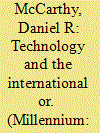

|
|
|
|
|
| Publication |
2013.
|
| Summary/Abstract |
Technological determinism as a theory of social change has been thoroughly tarnished in social theory, science and technology studies, and the discipline of International Relations. If once claims to an ahistorical development of technology (e.g. Cohen, 1978) were treated with significant respect, this is no longer the case. Indeed, it is by now a ritual to disclaim any notion of technological determinism in theories of international relations and the non-human world (Peoples, 2010; Herrera, 2006; McCarthy, 2011). Yet we must be careful of not throwing out the power of technological determinations with the teleological bathwater. This article attempts to develop a sociological account of technological determinism as dependent upon 'the International'. I will argue that technological determinism operates due to the presence of multiple political communities. Technological determinism is thereby reconceptualised as a distinct form of power in international politics.
|
|
|
|
|
|
|
|
|
|
|
|
|
|
|
|
| 10 |
ID:
123580
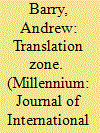

|
|
|
|
|
| Publication |
2013.
|
| Summary/Abstract |
This article examines the problem of how to translate actor-network theory into the field of international relations, and develops three arguments. Firstly, the article draws on Emily Apter's notion of the 'translation zone' both to rethink the concept of translation in actor-network theory and to highlight the relation between translation and politics. Secondly, the article interrogates the relation between actor-network theory and empirical research, emphasising the ways in which empirical case studies can have theoretically generative implications. Indeed, actor-network theory should not be understood as a body of theory that can be simply applied to a range of empirical examples. Finally, the article examines a number of problems that international relations poses for actor-network theory. I argue that actor-network theory needs to be adjusted and reconfigured in response to the challenge of international relations.
|
|
|
|
|
|
|
|
|
|
|
|
|
|
|
|
| 11 |
ID:
123586


|
|
|
|
|
| Publication |
2013.
|
| Summary/Abstract |
The turn to military robotics is a striking feature of contemporary Western warfare. How then to make sense of the increasing reliance on unmanned weapons systems, in particular, the use of combat-enabled Unmanned Aerial Vehicles/drones? Questioning the intuitive and oft-repeated claim that robotics 'take the human experience out of war' (reducing it to a video game), I argue that in order to make sense of current developments, we need precisely to reconsider our understanding of the human, her role in, and experience of, war. In this, we are aided by a critical materialist inquiry that investigates the human-material assemblage as a complex whole, taking both fleshy and steely bodies into account. Drawing on the philosophies of Maurice Merleau-Ponty and Judith Butler, I show that only by considering what being human means - in ontological terms - and by asking how human experience is altered through new technologies will we be able to think politically and ethically about contemporary war.
|
|
|
|
|
|
|
|
|
|
|
|
|
|
|
|
| 12 |
ID:
123585


|
|
|
|
|
| Publication |
2013.
|
| Summary/Abstract |
In the 'human' world we believed that we could transform necessity into freedom through our own creativity and agency, understanding the laws of the external world and mastering them through the development of culture, science and technology. In the 'post-human' world, we are told by new materialists, actor-network theorists and post-humanists that creativity and agency still exist, but that they are not the property of humans alone; rather, they are a product of the assemblages, associations and relationships through which we are attached to the world. Rather than attempting to understand and act in the world on the basis of our separation from it - articulated in the constraining, alienating and resentment-filled modernist divides of human/nature, subject/object, culture/environment - we should develop our understandings of 'attachment' to the world. This article critically examines these claims and suggests that, on the contrary, we become less 'attached' and that the external word becomes increasingly alien and mysterious to us. In doing so, it mounts a defence of subject/object understandings and social constructions of freedom and necessity.
|
|
|
|
|
|
|
|
|
|
|
|
|
|
|
|
|
|
|
|
|